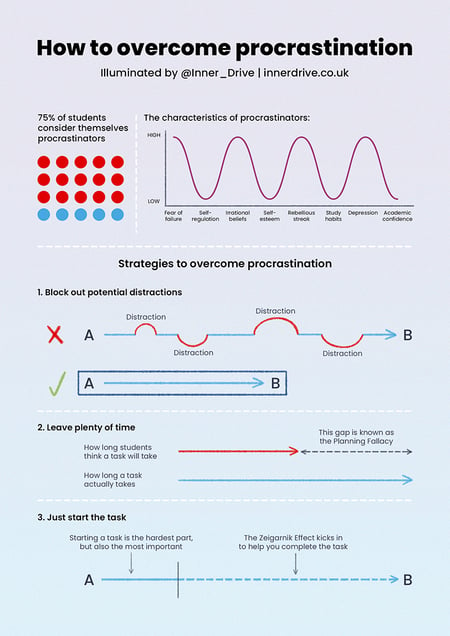Every student has been there. Working last-minute to meet a deadline while criticising themselves for not starting the assignment sooner. Yet they do it again and again, to the point where it negatively impacts their physical and mental health.
Indeed, research has estimated that between 80% to 95% of students procrastinate. So, why does this happen, and how can we combat it?
What exactly is procrastination?
The word procrastination is derived from the Latin terms “Pro” (in favour of) and “crastinus” (tomorrow). It is essentially the act of avoiding a task that needs to be accomplished.
Though decades of research have reached a clear consensus on what procrastination is, the reasons behind procrastination are only just starting to emerge. While some argue that it has to do with poor study habits, others attribute it to more intrinsic attributes such as low self-esteem.
Why do students procrastinate?
It is likely that researchers have struggled to agree upon the cause of procrastination because there isn’t just one answer to this question. In fact, there are so many we even wrote a two-part blog series about it!
Your students may procrastinate because of one or a combination of these reasons…
Fear of failure
Students often find themselves procrastinating because they’re afraid of failing and not achieving the grades they want. A recent study found that university students who reported higher levels of fear of failure were more likely to procrastinate on their thesis papers.
Students often feel stress and even anxiety when pushed to do challenging tasks, and end up avoiding them through procrastination as a result.
Low self-efficacy
Self-efficacy refers to the confidence a person feels about their ability to perform a task well.
Research has consistently shown that people who tend to self-doubt and view themselves negatively are more likely to engage in behaviours like task delay and avoidance. They do this to protect their self-presentation, as it provide a convenient excuse for poor performance and negative outcomes.
It is also worth noting that self-efficacy is domain-specific. For example, a student may have high levels of general self-efficacy but low levels of academic self-efficacy, meaning they’re confident with social activities but less so with school assignments, leading to procrastination.
Poor concept of time
Students often underestimate the time it takes for them to complete a task. This was displayed in a well-known study where students were asked to predict how long they would take to complete various tasks. They found that over 70% of students finished their assignments later than they thought they would.
This is called the Planning Fallacy, and it often to blame for students mistakenly thinking they have ample time before their deadline then having to rush their work at the last-minute.
How to overcome procrastination
Now that we have identified the main characteristics of procrastinators, let’s uncover strategies students can adopt to overcome this bad habit…
Block out potential distractions
Every time a student gets distracted, they lose time and energy not only on the distraction but also on re-focusing on the task at hand.
With many learning materials shifting from print to digital, students often require electronics to complete their studies and assignments. This makes it very tempting for students to engage in other activities on the internet during supposed work time, leading to procrastination.
If students are unable to resist the temptation, they can prevent procrastination by downloading restrictive software. For example, you can ask your students to use StayFocused, a Google Chrome extension that blocks certain websites for a certain period. This ensures that your students stay focused and get tasks done.
Find this graphic and many more in our latest book, Teaching & Learning Illuminated!
Leave plenty of time
We know the Planning Fallacy doesn’t leave students with enough time to complete their tasks to their best ability, which leads to poorer grades. This is a big problem because it actually causes a procrastination cycle by reducing their academic self-efficacy – in turn, making them more likely to procrastinate.
It is therefore important for you to encourage your students to start important tasks early so they have plenty of time to complete it. Not only does this leave room for error if they predicted the time it would take them to complete wrong, it can also help them address potential issues early and lower the stress associated with assignments.
Just start the task
Try encouraging your students to commit just three minutes to starting an intimidating task – if they want to stop after those three minutes, they’re free to do so.
More often than not, this will create a momentum and they’ll just keep working on the task. And if they choose to stop, there will still be a benefit: research has found that students tend to remember information from incomplete tasks better than information from tasks already completed (this is known as the Zeigarnik Effect). This means that when your students eventually get back to the task, they will find it easier to do so.
Motivating your students to just start the task can also help them avoid putting off long tasks until the last minute and instead break it up into shorter efforts. This way, they can see themselves make progress and feel better about the task. This subsequently reduces their fear of failure, minimising their desire to procrastinate in the long run.
Final thoughts
Procrastination is a highly complex topic, and while the majority of students do it, it is for various reasons. At the end of the day, what drives a student to procrastinate highly depends on their personal traits and how they justify putting off work to themselves.
We hope your students adopt the tips above to change this self-handicapping behaviour and form new, healthy study habits.








